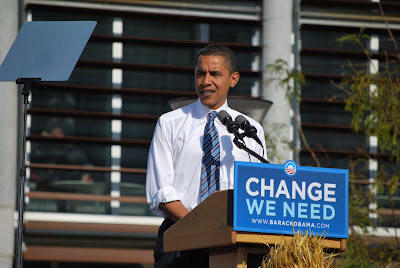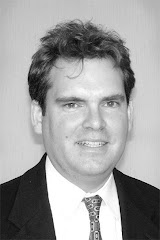
For most of the last 40 years we have lived in an era of lesser-than-two-evils presidential politics, a time when the nation has collectively yearned to reach into the history books for a Kennedy, Lincoln, Roosevelt - or even a Truman.
History returns to us on Tuesday.
With Barack Obama we have a candidate who is a historical presence in the present. Simply put, Senator Obama will be the next president of the United States.
Initially brushed off by the bobble-heads of the coastal chattering class as a political mercury rising who would fade in the colds of Iowa, Obama - who announced his candidacy nearly two years ago in Springfield, Ill., on Feb. 10, 2007, in bone-chilling weather - turned the idea of his unlikely presidency into the sophisticated business of a modern national campaign.
Obama blended hole-in-the-shoes work on the ground with an embrace of technology - using social networking sites on the Internet and text-messaging in ground-breaking ways. Obama had an uncanny ability to help define the intersection of technology and politics - rather than respond to it clumsily as did the campaign of John McCain, who at one point admitted to having never sent an e-mail himself.
The last weeks of the McCain campaign have not been a profile in courage for the man many Americans have long admired. It's as if McCain's Men with Blackberrys rushed the cockpit and took the throttle. His running mate Sarah Palin's events have been full of straw-grasping personal attacks with roots in Cold War smear tactics - talk of real Americas and other Americas, reds and patriots, the last carbohydrates fueling McCain's run.
We don't need the late-arriving Alaskan to tell us what to think of Obama.
We don't have to guess on this one.
Here in western Iowa's small towns we actually got to know Obama about as well as any voters in contemporary American presidential politics can.
Yes, when Obama speaks we see an African-American because that, after all, is what he is. But we hear the unmistakable voice of a Midwesterner in the Illinoisan who formed his early presidential principles in Iowa with a deep understanding of rural politics and issues. When you cut through all the clutter and high-mindedness about his barrier-shattering presidency, it is this Midwestern-ness that should encourage Hawkeye Staters when the calendar turns past Nov. 4 and breaks toward 2009.
On the issues that matter to Iowa Obama is one of us.
"What I see in Iowa are a lot the qualities I love in Illinois. I think there's a truth to the idea that there's a Midwestern sensibility and that people don't like a lot of fuss, don't like a lot of pretense, and I think are much more likely to think about things pragmatically and how do you get the job done as opposed to having a lot of ideology driving decision-making," Obama told the Daily Times Herald in an interview at the Carroll Rec Center in the fall of 2007. "And I think that's what America needs right now."
As a reporter and columnist based in Carroll, the hub of west-central Iowa, I tracked Obama's schedule for the nearly one-year campaign in Iowa. Some days, Obama would be in five, six or more small communities.
I'd give Obama better odds at finding his way from Carroll to Sioux City without a map than any of the pundits calling him elite.
His plan for a renewal of the American economy hinges heavily on the renewable energy that is finding a growing presence in western Iowa: wind, biodiesel.
"Instead of drill, baby, drill you have plant, baby, plant," Scott Wallace, grandson of former Vice President Henry Wallace, told the Daily Times Herald the other day.
Wallace, whose family founded the formidable Pioneer seed company, says Obama's rural policies reflect the prosperous nexus of agriculture and energy in a way that is lost on McCain.
In the presidential debates, when he had the universe of federal spending from which to choose for questions about possible cuts, McCain went right for the throat of ethanol, suggesting subsidies for it should be scuttled.
In the death throes of its campaign, the McCain camp has cannon-balled out label after label, as if one too-clever-by-half term ("Barack the redistributor") or wildly flailing charge (socialist or communist) can erase the last eight years of George W. Bush and the final eight weeks of McCain's White House bid.
Don't just consider the words of recent days. Look back.
In the summer of 2006 Obama delivered one of the more groundbreaking, even magisterial speeches, you'll hear, a "Call to Renewal" address in which he frankly discusses his own religious beliefs.
It is an inspiring speech, one I didn't think a contemporary American politician could deliver. It defines Obama.
"Faith doesn't mean that you don't have doubts," Obama said. "You need to come to church in the first place precisely because you are first of this world, not apart from it. You need to embrace Christ precisely because you have sins to wash away - because you are human and need an ally in this difficult journey."
Obama is a believable Christian because of his thoughtful journey with faith, one that involved those doubts.
He writes his own books and speeches and stuffs them with religious imagery. It's not something that can be faked.
Neither can intelligence, which in political terms can be defined as the self-confidence to absorb a variety of opinions, to encourage challenging points of view from advisers.
Defenders of lesser intellects like Sarah Palin argue that all one really needs is a group of good cabinet secretaries and staff members. Well, what happens when your top advisers offer differing opinions?
These times demand our best minds.
In the end, as we are in the final days of the campaign, I think back to the first hours I started to study Barack Obama.
I was listening to his reading of his best-selling memoir, "Dreams From My Father" while driving across Nebraska in 2005.
Raised by a single mother, Obama offered some penetrating insight into growing up that way, about the search for identity and understanding of one's place in the world - something made more challenging in the absence of a father.
On that journey Obama found America, and the nation found him.





No comments:
Post a Comment